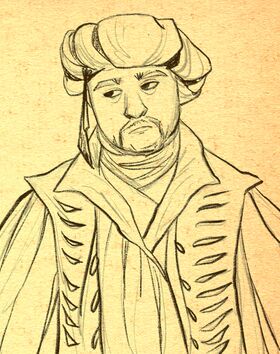Mran Gantorn
| Mran Gantorn | |
| The Laid-Back One | |
| Superhero warrior | |
|---|---|
| Powers | speed barrier |
| Personal details | |
| Born | 1813 FR |
| Died | 1901 FR |
Mran Gantorn was a Gantolian superhero warrior and socialite who in 1856 FR visited the Kingdom of Nadd and unwittingly saved it from the invasion of Mosk-Sopoh Dolysoh. As a result, Gantorn was first asked to prolong his stay, and later kept as a captive in Nadd as the only way to preserve the sovereignty of the kingdom.
Early life
Mran was born into a wealthy Gantorn family. His father, Bontorn Gantorn, owned several houses in Barmijanj, the largest city in Gantolia at the time.
Mran's abilities were discovered when he was a teenager. It is possible that they developed only by then, and as he continued to mature, the radius of the speed barrier grew.
His older brother was Linnit Gantorn, who became an influential politician in the same city. Mran served as his bodyguard until the age of 22, when the edges of the speed barrier moved too far away to be useful to protect only several people.
Abilities
See: Speed barrier
Mran developed what is known as a speed barrier, a superhero warrior ability that a number of other Gantolian superhero warriors also had. It involved having a barrier around the superhero warrior that prevented fast traveling objects from penetrating it. One had to move very slowly in order to be able to move through it. The barrier would expand with the age of its bearer, eventually spanning many kilometers.
Personality
Porteek quotes a diary of an oora from Nadd:
Cool, relaxed, with an air of superiority about him, our guest exhibited the kind of curiosity typical of wealthy powerful people: palaces and gold and statues hardly entertained him, but if he sighted a rat or an unusual flower, he would get excited like a child.
His demeanor was changing gradually. It seemed that he was unused to adversity and the realization of what was unfolding took time to register with him. When he was told he couldn't leave, he complied, but didn't seem to take the situation seriously. I even remember a smirk on his face: it was all a game to him.
But when his family's messenger came for him and couldn't get him out - that's when his face, maybe for the first time in his life, began to show genuine concern. He sent a letter to his father with the messenger, asking for help and also for money, as he was largely out of funds. Weeks went by, but there was no response. I remember that day when I came to visit him in his chambers, which were getting simpler by the day, as his purse was getting thinner. And that day I saw it in his eyes, in his shoulders, I heard it in his voice. It was a man who finally realized - he is finished. He is now no more than a prisoner in a foreign land.
